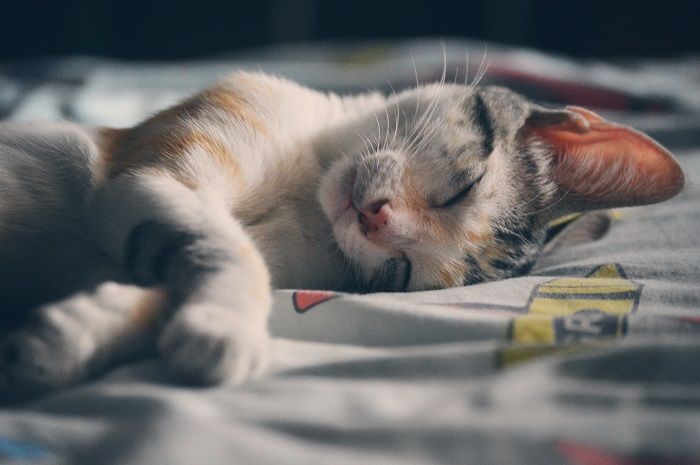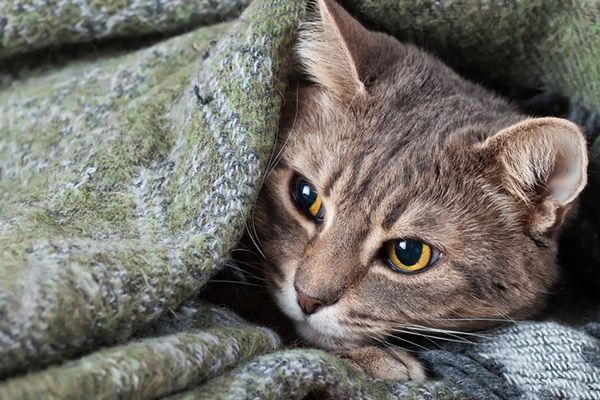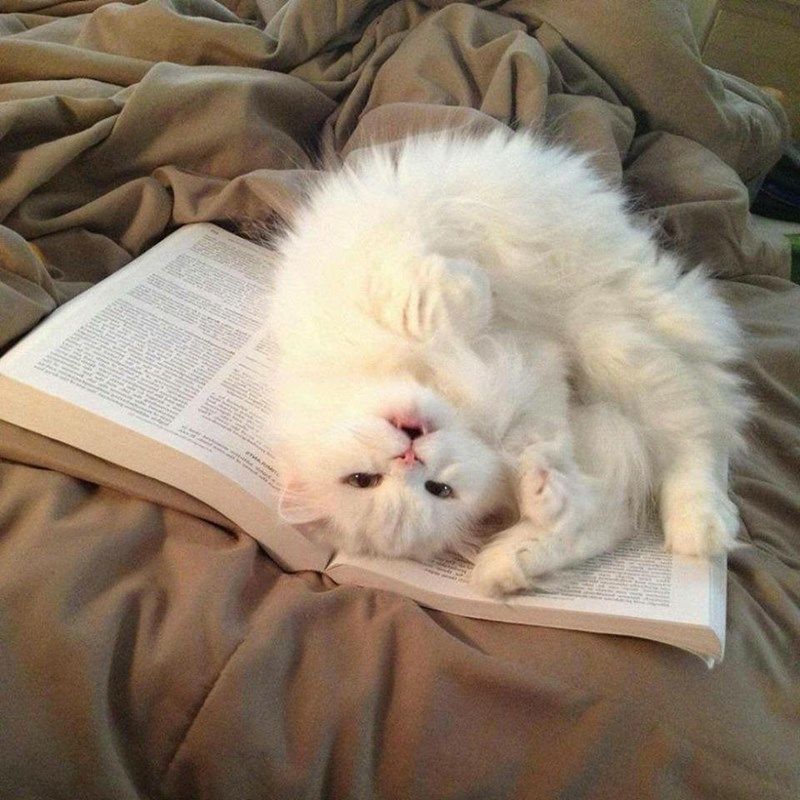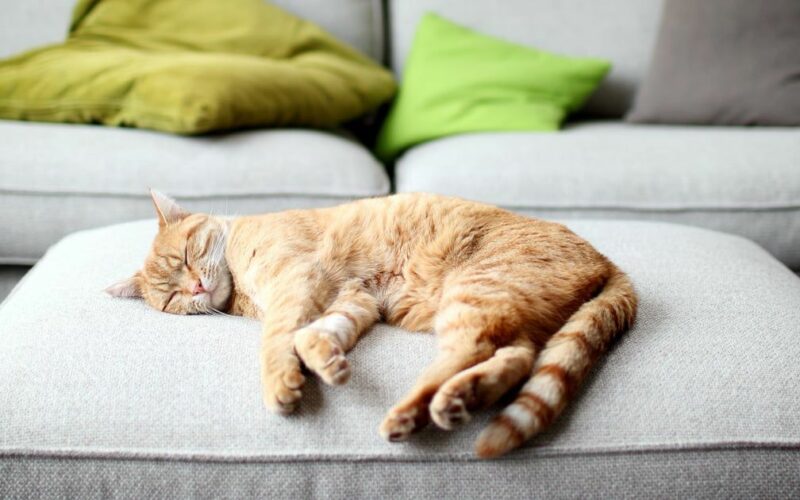We all know that cats and kittens love to sleep, and seeing them sleeping soundly is often a sign of happiness. But why do cats and kittens move when they sleep? Many owners have seen this happen, and scientists have even written about it.
As a pet owner, you should know why your cat twitches while sleeping. Here are 7 probable reasons why cats and kittens twitch when they sleep. We’ll also talk about what to do if you’re worried about how your cat sleeps:
1. Dreaming

Cats have vivid and sometimes strange dreams in their REM sleep cycle. This is because when cats are in REM sleep, their brains are more active than in other types of sleep. This is a lot like what happens in our brains when we dream.
Cats may move their paws, whiskers, nose or even meow in response to what they are dreaming. This is probably because the cats’ brains are trying to make sense of the things they see and feel in their dreams and react in a way similar to how they would respond in real life. Even though cats don’t dream as long as we do, their dreams can still be intense, and they may twitch or move.
People think that cats dream as much as people do and that they can remember and make sense of their dreams in the same way. When cats move or twitch during their REM sleep cycle, it’s likely because they dream and try to respond to the dream in a way they know how. This is why cats sometimes move or twitch when they are sleeping. They are trying to figure out what is going on in their dreams.
2. Neurological Disorders
Cats are known for doing strange things that can’t always be explained. One of these is that they twitch or spasm while they sleep. This can be scary for the owner, and it’s essential to figure out why the dog is acting this way so you know what to do next. Neurological disorders are one of the most common reasons cats twitch while sleeping.
Cats can twitch or spasm their muscles while they sleep if they have epilepsy, seizures, or nerve damage. This is often caused by neurons in the brain firing incorrectly, making the cat’s muscles suddenly tighten and loosen. Call your vet if your cat twitches while sleeping and you think it might be because of a neurological disorder. This will allow your pet to be checked out and treated correctly. Other health problems, like metabolic disorders, kidney or liver disease, or parasites, can cause twitching or spasming while sleeping.
Before you say a neurological disorder causes the twitching, you should talk to your vet to ensure there aren’t any other health issues. Cats can also twitch in their sleep because of stress or too much excitement in their environment. Even though these cases may not need medical help, it is essential to determine where the anxiety is coming from and take steps to reduce or eliminate it. In all these cases, you should keep an eye on your cat’s behavior and call your vet if the twitching continues or worsens.
3. Discomfort or Pain
One of the main reasons cats twitch in their sleep is because they are in pain or uncomfortable. Cats might move around and fidget while sleeping if they have fleas, allergies, or other skin or health problems. Flea bites can be very painful, and itching can make cats twitch as they try to eliminate the irritation on their skin.
Cats can also be uncomfortable because of allergies, which can cause them to twitch and move around as they try to find a comfortable position to sleep in. Cats may even move in jerky ways as they try to scratch an itch or rub against something to make their skin feel better. A common reason for twitching in your sleep could also be a health problem like nerve damage or joint pain.
Cats with nerve damage may twitch and kick their legs, and cats with joint pain may fuss and move around to find a comfortable position. Cats may also twitch in their sleep because they have muscle spasms. This can be caused by being dehydrated, having an electrolyte imbalance, or not getting enough food. It’s essential to keep your cat’s environment comfortable and give it a balanced diet and plenty of water to get a good night’s sleep.
4. Age-related Changes

As cats get older, their bodies may change in ways that have to do with getting older. These can include muscles that get weaker, twitches, and tremors that happen while they sleep. This is especially clear in older cats, whose muscles may not be controlled while they sleep.
Even though the exact cause is unknown, it is thought to have something to do with how the cat’s nervous system changes as it ages. These uncontrollable muscle movements can be as small as a twitch or as big as a jerk. Even though these are usually harmless, if your cat twitches a lot while sleeping, you should take them to the vet to rule out any serious health problems.
Some cats may also twitch because they have Feline Sleep Disorder, a disease. This rare condition makes cats restless while they sleep and can cause them to twitch and move in strange ways. Getting your cat to a vet as soon as possible is essential if it shows signs of this disorder.
5. Stress or Anxiety

Cats can be susceptible animals that react to the slightest changes in their environment or how they do things. This can make them feel stressed or worried, setting off their “fight or flight” response. This response evolved to help animals deal with possible danger.
Cats and other animals do the same thing. When a cat is so tense, adrenaline is released into its system. This can cause them to twitch or move while they sleep. When a cat is anxious or stressed, it often twitches in its sleep, either because of a new pet or person in the house, too much noise or commotion or because they are sick.
If your cat twitches while sleeping, it may need more comfort and care. Spend time playing with them and giving them places to hide and chill out. If your cat’s twitching doesn’t stop, you might want to talk to your vet because it could signify a more severe problem.
6. Parasomnias
Parasomnias are sleep disorder that causes people to act strange while sleeping. This can cause cats to sleepwalk, talk, and twitch while sleeping. Cats often twitch in their sleep, which can signify parasomnia. It usually involves short, jerky muscle contractions and can be accompanied by licking and chewing movements of the face. Cats can twitch in their sleep for several reasons, like stress, a history of trauma, or a neurological disease.
A medical condition can also cause twitching. It can be likened to epilepsy or seizures that are going on underneath the surface. The twitching can also be caused by insufficient sleep or an irregular sleep cycle. Sometimes the twitching is caused by an imbalance of hormones, such as too much adrenaline being made. Most of the time, twitching is not a sign of a severe health problem and can be fixed by changing how you live.
Sometimes, a vet may give the animal medicine or other treatments to treat any underlying health problems causing the twitching. Cats sometimes twitch in their sleep, which can be scary for their owners but is usually nothing to worry about. If the twitching lasts for a long time or is accompanied by other symptoms, such as a lot of noise or seizures, you should talk to a vet to find out what’s wrong and how to treat it.
7. Feline Hyperesthesia Syndrome
Feline Hyperesthesia Syndrome, also called “rolling skin disease,” is a condition that affects cats of all ages. However, it is more common in cats over five years old. It is marked by intense twitching or rippling of the skin, which usually happens when the person is sleeping. It is thought that this is because the person is more sensitive to changes in the environment or touch.
In addition to twitching or rippling, cats with this condition often act restless, groom themselves more, and make more noise. The exact causes of Feline Hyperesthesia Syndrome are unknown. Still, it is thought to be caused by nerve signals that don’t work right or a problem with the hormones that keep the nervous system in check. Treatment usually includes environmental changes and medicines that work on the nervous and hormonal systems.
Sometimes, you may also need to change the cat’s behavior to help with its stress and anxiety. Feline Hyperesthesia Syndrome is a severe illness that can make cats and their owners unhappy. So, if you see any of the above symptoms in your cat, you should call your vet to discuss a treatment plan. Doing this can help ensure your cat is healthy and give your pet the best care possible.
Final Thoughts
Cats are mysterious and exciting creatures, and they keep us amused while they sleep. But why do they move while sleeping? Even though there are different ideas, most people agree that cats twitch in the REM stage of sleep, just like people do. We remember our dreams when we are in REM sleep. Since cats can sleep up to 16 hours a day, a much more significant portion of their sleep is in REM sleep than it is for humans.
Most cats do not need to see a vet when they twitch while sleeping because it is typical. But if your cat is tired, has less of an appetite, is throwing up, or has stiff or jerky movements all over its body, you should call a vet to ensure your cat is healthy. Seizures are something to be aware of, but they don’t only happen when your cat is sleeping. They can also occur when your cat awakens, and you may notice that they are acting strangely.
So, don’t worry if your funny little cat twitches while sleeping. Most of the time, this is nothing to worry about, and it can even be nice to watch. Cats can help you feel less anxious; their purring can calm your nervous system and lower your blood pressure. So, relax, sit back, and enjoy the show!
Further Reading






